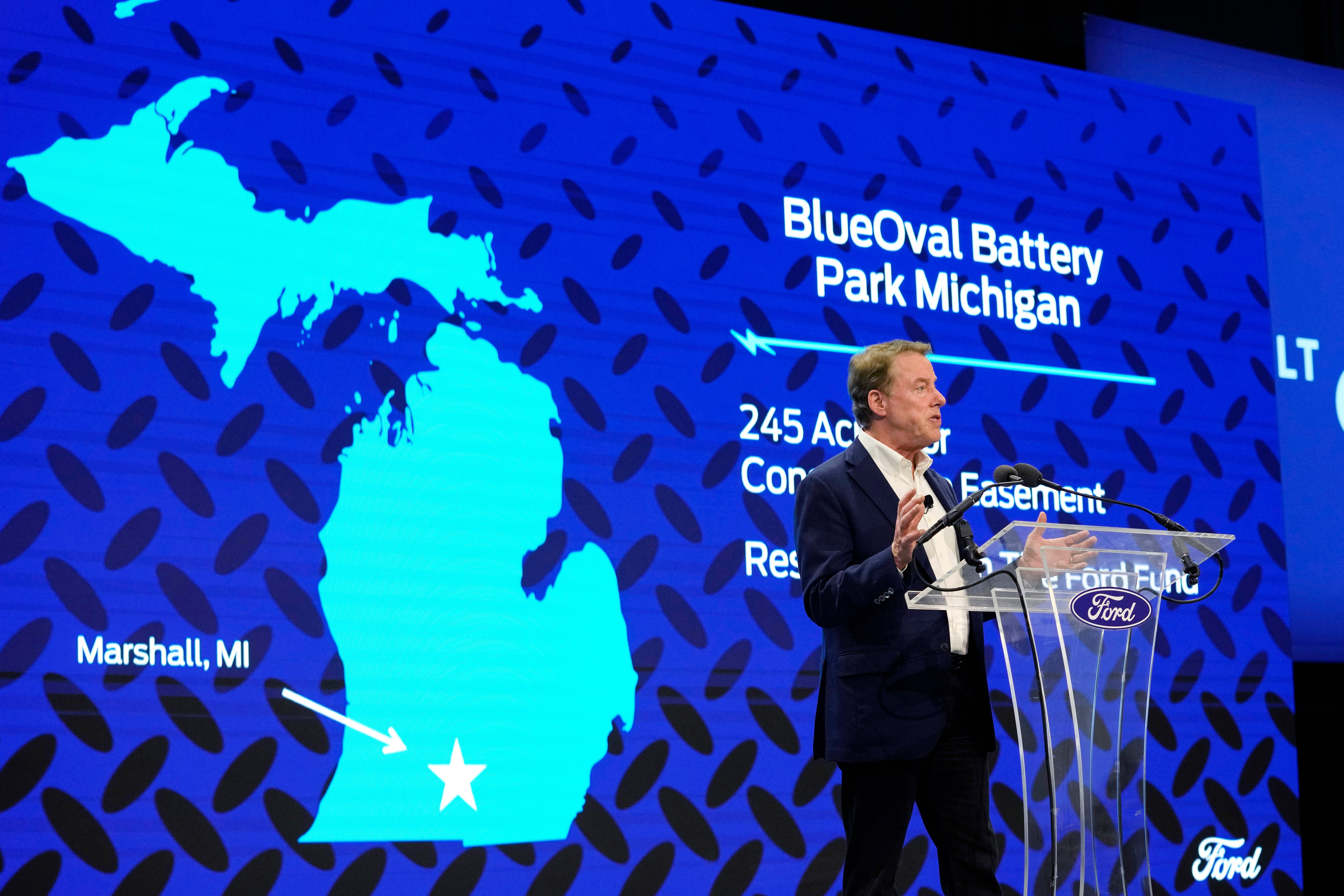Ford pausing construction of Michigan battery plant amid contract talks with auto workers union
Ford says it’s pausing construction of a $3.5 billion electric vehicle battery plant in Michigan until it is confident it can run the factory competitively

Your support helps us to tell the story
From reproductive rights to climate change to Big Tech, The Independent is on the ground when the story is developing. Whether it's investigating the financials of Elon Musk's pro-Trump PAC or producing our latest documentary, 'The A Word', which shines a light on the American women fighting for reproductive rights, we know how important it is to parse out the facts from the messaging.
At such a critical moment in US history, we need reporters on the ground. Your donation allows us to keep sending journalists to speak to both sides of the story.
The Independent is trusted by Americans across the entire political spectrum. And unlike many other quality news outlets, we choose not to lock Americans out of our reporting and analysis with paywalls. We believe quality journalism should be available to everyone, paid for by those who can afford it.
Your support makes all the difference.Ford Motor Co. said Monday that it's pausing construction of a $3.5 billion electric vehicle battery plant in Michigan until it is confident it can run the factory competitively.
The move comes as the company is in the midst of national contract talks with the United Auto Workers union, which wants to represent workers at battery factories and win them top wages.
The UAW went on strike against Ford and the other two Detroit automakers, General Motors and Stellantis, on Sept. 15. The union at first targeted one vehicle assembly plant from each automaker, and last week expanded it to parts warehouses. But Ford was spared from the expansion because the union said progress was being made in negotiations.
In February, Ford announced plans to build the plant in Marshall, Michigan, employing about 2,500 workers to make lower-cost batteries for a variety of new and existing vehicles. Marshall is about 100 miles (160 kilometers) west of Detroit and is near two major interstate highways.
But Ford spokesman TR Reid confirmed Monday that plant construction has been paused and spending has been limited on it.
“There are a number of considerations,” he said in an email. “We haven't made any final decision about the planned investment there.”
There also has been local opposition to the factory location, and criticism of a Chinese company's involvement in the plant, which would be run by a wholly owned subsidiary of Ford.
The factory was to start making batteries in 2026, cranking out enough battery cells to supply 400,000 vehicles per year, Ford said.
It would produce batteries with a lithium-iron-phosphate (LFP) chemistry, which is cheaper than the current nickel-cobalt-manganese chemistry now used in many EV batteries. Consumers could then choose between a battery with lower range and cost, or pay more for higher range and power.
Ford said the subsidiary would own the factory and employ the workers. But China’s Contemporary Amperex Technology Co. Ltd., or CATL, which is known for its lithium-iron-phosphate expertise, would supply technology, some equipment and workers.
Republican State Rep. Sarah Lightner, whose district includes Marshall, said Monday the news from Ford “came out of the blue.”
“We’re still gathering information because there’s a lot of moving parts,” Lightner said.
While the state had allocated nearly $1.7 billion in incentives for the project, not all of the money has been sent out and there are clawbacks in place, added Lightner, who is the minority vice chair of the House Appropriations committee.
“Obviously, the strikes could probably have something to do with it,” Lightner said.
Sam Abuelsamid, an analyst with Guidehouse Insights, said Ford’s decision might be related to the strike but more likely reflects opposition to the plant among people in a conservative rural area of southern Michigan.
"They don’t want the factory, they don’t want the traffic, and they don’t want anything associated with a Chinese company,” he said.
Abuelsamid said he was surprised that Ford didn’t select a site closer to Detroit, which he thinks would be less hostile to the idea of a battery plant using a Chinese company’s intellectual property.
The plant was announced at a time when U.S.-China relations are strained, and the Biden administration is offering tax credits for businesses to create a U.S. supply chain for EV batteries. To get a full $7,500 per vehicle U.S. tax credit to customers, EV batteries won’t be able to have metals or components from China in them.
The structure of the deal allows Ford to take advantage of U.S. factory tax credits in the Inflation Reduction Act.
Earlier this year the state of Virginia dropped out of the race for the same Ford plant after Gov. Glenn Youngkin characterized the project as a “front” for the Chinese Communist Party that would raise national security concerns. At the time Virginia had not offered an incentive package to Ford.
____
Associated Press writers Joey Cappelletti in Lansing, Michigan, and David Koenig in Dallas contributed to this report.